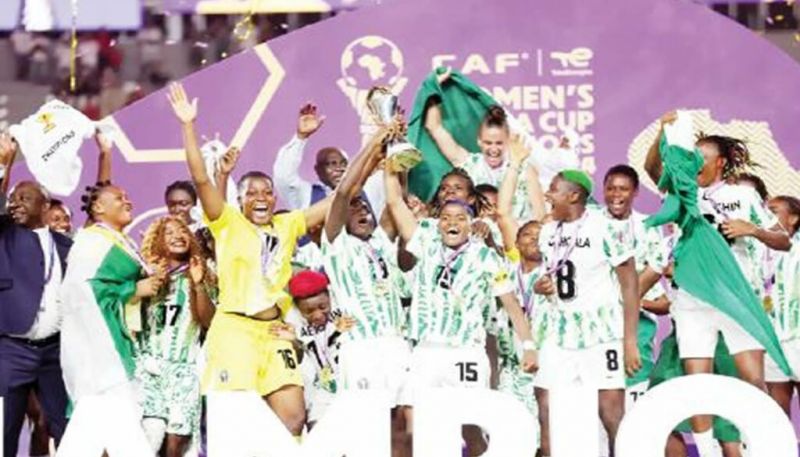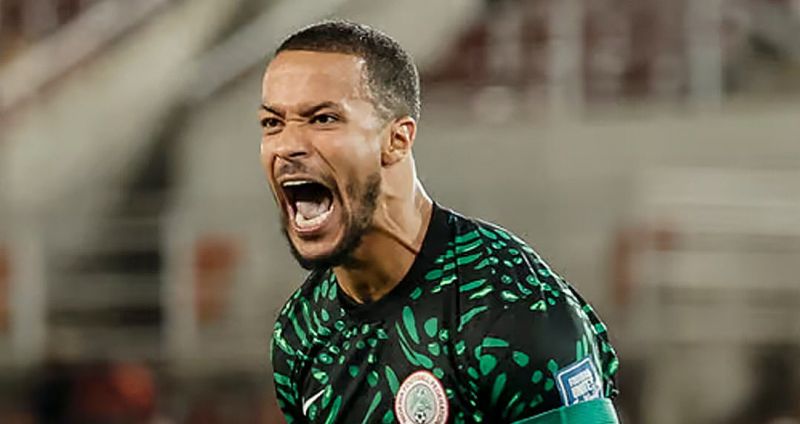By Daily Sports Nigeria on August 5, 2025

Nigeria’s D’Tigress and Super Falcons defied the odds to claim continental glory, with both teams overcoming significant challenges and doubters to extend their dominance in African women’s sport, PETER AKINBO writes
Mixed starts
The Super Falcons entered the 2024 Women’s Africa Cup of Nations in Morocco carrying the burden of their 2022 semi-final penalty defeat to the same hosts, whilst D’Tigress encountered preparation issues that threatened their title defence.
Nigeria opened their Group B campaign with a commanding 3-0 victory over Tunisia. The emphatic win suggested the Falcons had found their rhythm early, but their next encounter against Botswana proved that no match would be straightforward.
The Mares, ranked as the tournament’s lowest side, frustrated Nigeria for 89 minutes before Chinwendu Ihezuo’s late strike secured a narrow 1-0 victory. It was a warning sign that Justine Madugu’s side would need to be at their best throughout the competition.
Meanwhile, D’Tigress were stuck in their own pre-tournament chaos. What should have been a routine preparation period turned into a logistical nightmare as the National Sports Commission abandoned the traditional US training camp model. Instead, players based in America and Europe were expected to converge on Abuja for a homecoming tournament that never materialised as planned.
The six-time African champions were supposed to begin camping over a month before the tournament, but flight tickets that should have been distributed in May only arrived on July 16. Coach Rena Wakama’s squad found themselves dealing with administrative challenges that have plagued Nigerian sports for years.
At this time, the Falcons were facing Algeria in their final group match, and coach Madugu rotated his squad, securing a 0-0 draw with a much-changed lineup as Nigeria had already qualified for the knockout stages as Group B winners.
Their quarter-final opponents, Zambia, were expected to provide a stern test. Instead, the Falcons delivered one of their most emphatic performances, crushing Zambia 5-0 with goals from Osinachi Ohale, Esther Okoronkwo, Ihezuo, Oluwatosin Demehin, and Folashade Ijamilusi.
D’Tigress, meanwhile, began their title defence in less than ideal circumstances but with their winning mentality intact. Despite the preparation difficulties, they opened with a commanding 92-45 victory over Rwanda at the Palais des Sports de Treichville in Abidjan, with Elizabeth Balogun leading the scoring with 18 points.
The win extended their remarkable unbeaten run to 25 games, but tougher tests lay ahead. Their second group fixture against Mozambique proved more challenging, with Nigeria losing the first quarter 13-9 before grinding out a 60-55 victory.
In the quarter-finals against Cameroon, the D’Tigress delivered an 83-47 demolition that showcased their depth and quality. The victory set up a mouth-watering semi-final clash with Senegal, now coached by former Nigeria mentor Otis Hughley—a reunion that added emotional complexity to an already high-stakes encounter.
Crunch time
The Falcons’ semi-final against defending champions South Africa lived up to its billing as a classic encounter. Nigeria took the lead through Rasheedat Ajibade just before halftime, but the Banyana Banyana equalised through Linda Motlhalo in the 60th minute.
With the match heading towards extra time, Michelle Alozie’s cross found its way into the South African net in the 94th minute, sending Nigeria into their 10th WAFCON final.
The D’Tigress semi-final also proved to be everything anticipated. Senegal started strongly, but Nigeria clawed back to take the first quarter 22-17 and edge the second 21-20 for a 43-37 halftime lead. The third quarter belonged to Senegal, who roared back with a massive 21-9 advantage to level the contest.
But D’Tigress showed why they are champions, mounting a fightback for the ages in the fourth quarter. Despite Murjanatu Musa fouling out early, Kalu and Okonkwo stepped up to help Nigeria win the final 10 minutes 23-10 for a thrilling 75-68 victory. The win extended their unbeaten streak to 28 games and set up a fifth consecutive final appearance.
A tale of comebacks
For the Falcons, their final against Morocco represented the ultimate test. The hosts had invested heavily in women’s football and were seeking their first continental title in front of a partisan crowd at the Olympic Stadium in Rabat. The 21,000-capacity venue was buzzing with expectation as Morocco got off to a dream start.
Captain Ghizlane Chebbak opened the scoring with a brilliant curling effort from outside the box in the 13th minute, before Sanaâ Mssoudy doubled the lead just 11 minutes later. Nigeria appeared stunned, trailing 2-0 at halftime and facing the prospect of a second consecutive defeat to Morocco.
But the Falcons’ experience and pedigree shone through in the second half.
The comeback began in the 64th minute when Okoronkwo converted a penalty after a VAR review for handball. Seven minutes later, Okoronkwo turned provider, setting up Ijamilusi to level the match.
With two minutes remaining, Jennifer Echegini completed one of the most dramatic comebacks in WAFCON history, firing Nigeria ahead after latching onto Okoronkwo’s free kick.
D’Tigress faced their own final test against Mali, with the opportunity to make history by becoming the first team to win five consecutive AfroBasket titles. Despite Mali claiming the first quarter 26-21, Nigeria’s experience told as they recovered to level at halftime 41-41.
The third quarter went Nigeria’s way 20-15, setting up a tense finale. But D’Tigress showed their championship mettle, winning the fourth quarter 17-8 to secure a 78-64 victory and extend their unbeaten streak to an extraordinary 29 games—a full decade without defeat at the competition.
Rewards
President Bola Tinubu recognised both achievements with identical reward packages—$100,000 for each player, three-bedroom apartments, and the national honour of Officer of the Order of the Niger. The recognition reflected not just their sporting success, but their ability to inspire a nation through their refusal to accept defeat.
Both the Falcons and D’Tigress had defied the odds, overcome adversity, and proven once again why they remain the queens of African women’s sport.
Source Punch Ng
Posted August 5, 2025
You may also like...

Tuchel makes odd excuse for Chelsea defeat to...

Maja Equals Ekoku’s 28-Year-Old Premier League Record

Six winless games are a concern, admits Pep...

Osimhen Joins Benzema As Highest Scoring Player In...

Aubameyang Sparks Contract Speculation

Fashanu backs Mikel's Teda move

 Akinwunmi hails Digivant Bank for Dare to Dream tourney
Akinwunmi hails Digivant Bank for Dare to Dream tourney NPFL: Rangers dismantle Bayelsa, Mbaoma inspires Remo triumph
NPFL: Rangers dismantle Bayelsa, Mbaoma inspires Remo triumph Bayelsa brace for 2026 international marathon
Bayelsa brace for 2026 international marathon Chelsea’s Maresca says rotation unavoidable
Chelsea’s Maresca says rotation unavoidable Joshua makes weight for €100m Paul fight
Joshua makes weight for €100m Paul fight Osimhen, Iwobi pay tributes to Troost-Ekong
Osimhen, Iwobi pay tributes to Troost-Ekong Amorim defends his use of midfielder Mainoo
Amorim defends his use of midfielder Mainoo 'Always in my mind to start' - Slot on Salah
'Always in my mind to start' - Slot on Salah Man City won't take risk on 'suffering' Rodri's return
Man City won't take risk on 'suffering' Rodri's return Arsenal's Mosquera could be out for at least six weeks
Arsenal's Mosquera could be out for at least six weeks Iran to attend World Cup draw after boycott threat
Iran to attend World Cup draw after boycott threat Alexander-Arnold off injured in comfortable Real Madrid win
Alexander-Arnold off injured in comfortable Real Madrid win Rangers International going, going . . . (63,394 views)
Rangers International going, going . . . (63,394 views) Amaju Pinnick: A cat with nine lives (54,635 views)
Amaju Pinnick: A cat with nine lives (54,635 views) Second Term: Amaju Pinnick, Other NFF Heavyweights Home to Roost •How Pinnick Broke the Jinx (52,571 views)
Second Term: Amaju Pinnick, Other NFF Heavyweights Home to Roost •How Pinnick Broke the Jinx (52,571 views) Current issues in Nigerian sports: Matters arising (52,212 views)
Current issues in Nigerian sports: Matters arising (52,212 views) Sports Development: Zenith Bank on the zenith (52,184 views)
Sports Development: Zenith Bank on the zenith (52,184 views) Missing $150,000 IAAF Grant: Solomon Dalung’s Hide and Seek game (52,095 views)
Missing $150,000 IAAF Grant: Solomon Dalung’s Hide and Seek game (52,095 views) Gov. Abdullahi Ganduje’s solid footprints, commitment to sports development in Kano State (51,940 views)
Gov. Abdullahi Ganduje’s solid footprints, commitment to sports development in Kano State (51,940 views) NFF Presidency: Pinnick, Maigari, Ogunjobi, Okoye in Battle for Supremacy (51,526 views)
NFF Presidency: Pinnick, Maigari, Ogunjobi, Okoye in Battle for Supremacy (51,526 views) Olopade, BET9A wave of revolution in NNL (50,665 views)
Olopade, BET9A wave of revolution in NNL (50,665 views) Commonwealth Games 2018: Shame of Muhammadu Buhari, Solomon Dalung (49,219 views)
Commonwealth Games 2018: Shame of Muhammadu Buhari, Solomon Dalung (49,219 views) Ibrahimovic’s Man U exit: Whose decision is it? And in whose interest? (47,608 views)
Ibrahimovic’s Man U exit: Whose decision is it? And in whose interest? (47,608 views) John Mikel Obi: Segun Odegbami’s Outrageous Call! (47,082 views)
John Mikel Obi: Segun Odegbami’s Outrageous Call! (47,082 views)